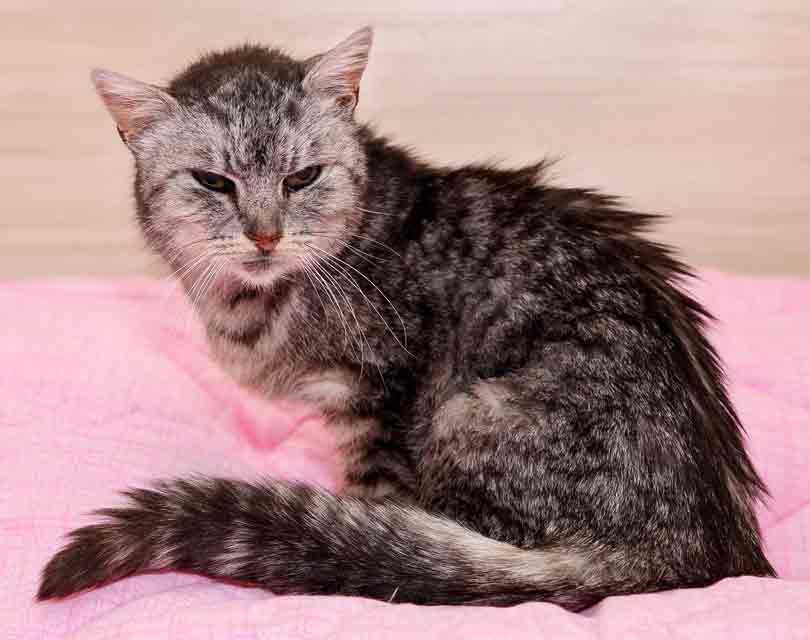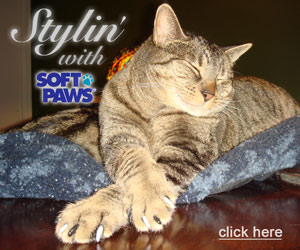- Home
- Hyperthyroidism in Cats: How to Recognize and Treat It

Hyperthyroidism in Cats: How to Recognize and Treat It

Hyperthyroidism has been an exceptionally commonly diagnosed condition in cats since the mid-1970s. Scientists are still trying to work out its exact cause or causes, but cat owners must know the signs and get their kitty to the vet right away if they see them.
Signs of Hyperthyroidism in Cats
Hyperthyroidism is an overactive thyroid gland. The thyroid has two lobes and sits in the front part of a cat's neck. It produces hormones that regulate metabolism, among other things. Hyperthyroidism in cats can be caused by either a non-cancerous or cancerous tumor in the thyroid gland.
During hyperthyroidism, the gland is producing extra hormones, and the signs the cat exhibits are related to increased metabolism. They include:
- Increased appetite
- Yowling and searching for food
- Eating people food or developing pica
- Hyperactivity—pacing and acting ramped up
- Irritability
- Extreme weight loss
- Increased water consumption and urination
- Vomiting and diarrhea
- Aggression
Diagnosis of Feline Hyperthyroidism
Diagnosis of an overactive thyroid gland can be tricky because its signs can be caused by other conditions common in older cats such as kidney disease and intestinal cancer. A veterinarian will perform a thorough exam and may feel enlarged thyroid glands in the cat's neck. A blood panel to evaluate kidney and liver function can help rule out other conditions, and thyroid hormone levels are usually high.
Treatment of Hyperthyroidism in Cats
There are four ways to treat feline hyperthyroidism, and your veterinarian can help you determine which one is best for your cat's circumstances. Below are the four treatment methods, along with their pros and cons:
Oral Medication for Hyperthyroidism
Methimazole is the most common medication used to control hyperthyroidism. It's given daily, and then the veterinarian monitors routine blood work to determine whether the dosage needs to be adjusted over time.
There are some potential side effects of the medication, which is one reason monitoring is essential. A cat's needs can vary over time, so the right amount of methimazole must be given to control the hyperthyroidism while minimizing the possibility of side effects. Some cats experience a severe reaction to methimazole, which includes life-threatening anemia. Those cats can't take the medication, and a different method must be used to treat their condition.
Giving the medication orally can be difficult with some cats. Pill pockets, which can conceal the pill inside a treat, work well for some kitties. Another alternative is to use a specialty pharmacy to have the drug compounded into an intradermal formulation. Then, the owner puts the gel (using gloves) onto the cat's ear flap, where it is absorbed into their system. This method is not as reliable as the oral formulation is, so blood work must be done routinely to make sure it's working well.
Surgery for Hyperthyroidism
Surgery is the second way of treating hyperthyroidism in cats. For this treatment, the thyroid gland is removed. The procedure works very well in most cats, especially those that have a benign tumor in their thyroid gland that hasn't spread elsewhere in the body.
However, most cats with hyperthyroidism are older, and they sometimes have other conditions that make the general anesthesia necessary for the surgery quite risky.
Surgery is a cure for hyperthyroidism in most cases, while the oral medication is not. Sometimes, bits of the thyroid gland that aren't visible to the surgeon can remain in the cat's body and cause recurrence of the hyperthyroidism later.
Radioactive Iodine Therapy for Hyperthyroidism
For this treatment, the cat is given an injection of radioactive iodine, which goes to the thyroid gland and destroys the tumor there. This is usually not a treatment performed at general veterinary clinics, but specialty hospitals and feline-only practices may offer it. It requires a thorough work-up to make sure the kitty doesn't have any other problems or a spread of the cancerous form of hyperthyroidism. The cat usually stays in the clinic for a few days surrounding the treatment. There are specific requirements for handling the cat's waste, which will be radioactive for some time afterward. This treatment is a cure for hyperthyroidism.
Special Diet for Hyperthyroidism
Hills Diet makes a prescription food called y/d that is meant to treat hyperthyroidism. It has very low iodine levels, which makes it hard for the thyroid gland to build its hormones. However, it is controversial how well this works and whether it may trigger other problems. Also, the cat cannot get any other diet, treat, or human food for it to work.
Most cats can be successfully treated for their hyperthyroidism. If your cat has the condition, your veterinarian will work with you to determine the best, most cost-effective treatment for your kitty.

 Loading... Please wait...
Loading... Please wait...







